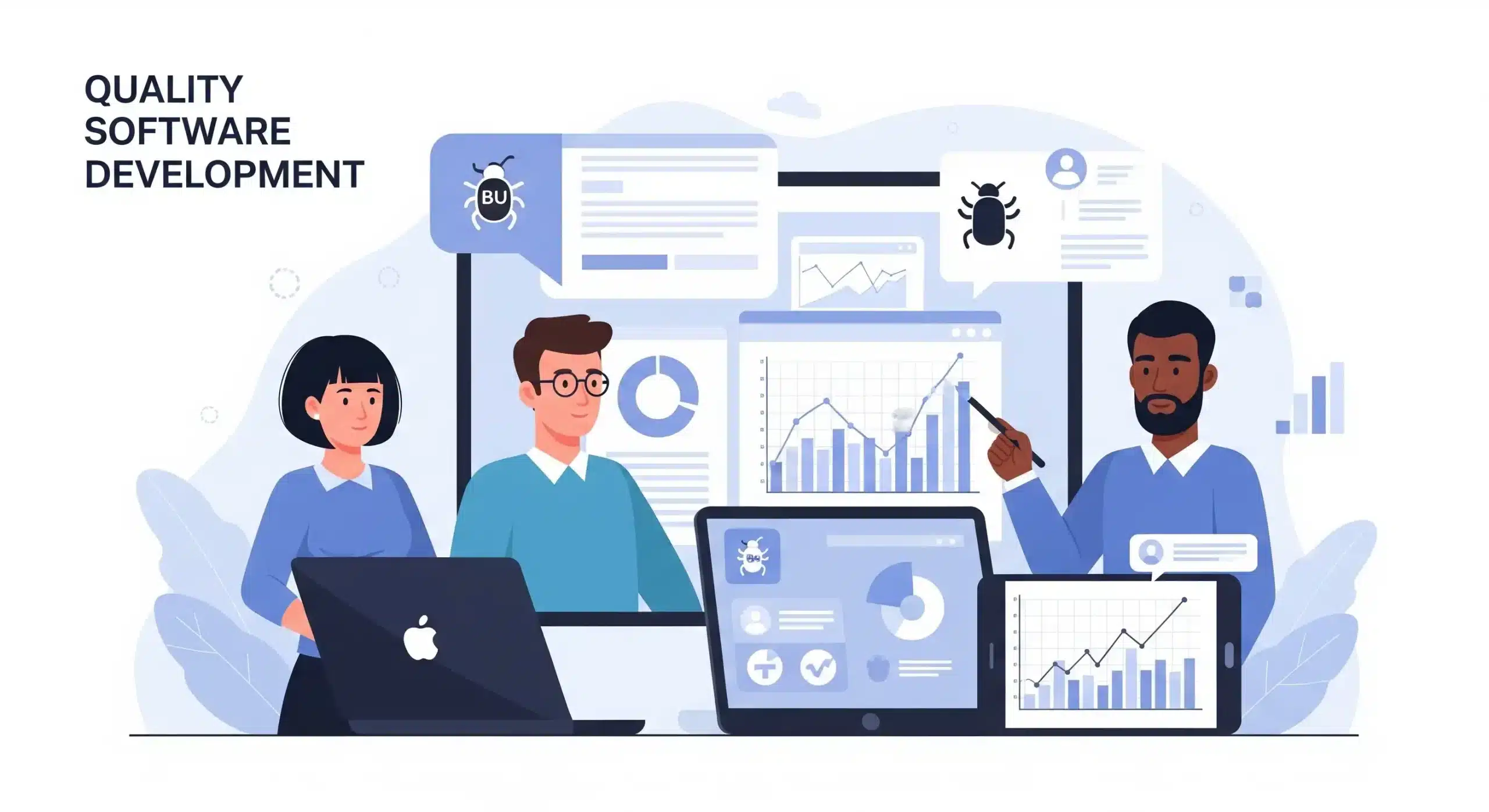The Future of AI Consulting: Trends and Predictions for 2025

Artificial intelligence (AI) is reshaping industries, presenting both opportunities and challenges for businesses. AI consulting aids companies in refining processes, products, and services through harnessing AI technologies. Consultants play a pivotal role in devising AI strategy, implementing tailored solutions, and providing crucial training for seamless adoption.
The future of AI consulting encounters hurdles, despite its undeniable potential. Common challenges are experienced by consultants and clients alike. In this discourse, we delve into the present state, highlighting challenges and exploring emerging trends influencing AI consulting into 2025 and beyond.
AI technology in the future will rapidly evolve, shaping industries. As businesses adapt, the role of AI consultants in guiding technology adoption becomes crucial. The integration of advanced AI technology in the future will be pivotal for success, with consultants navigating complexities and harnessing its full potential.
Current Challenges Of AI Consulting
AI consulting, a rapidly growing and competitive market, is shaped by diverse players offering various services and solutions. As per Grand View Research, the global AI consulting market was valued at USD 6.9 billion in 2020 and is projected to witness a substantial compound annual growth rate (CAGR) of 35.9% from 2021 to 20281.
Yet, the industry faces significant challenges that define its future:
Limited AI Expertise and Talent
The future of AI consulting is entwined with the need to address the scarcity of AI expertise. AI’s complexity demands technical, business, and domain skills, leading to a shortage of qualified professionals. A survey by IBM and Morning Consult reveals that 37% of companies cite limited expertise as a significant adoption barrier2.
Increasing Data Complexity and Silos
The future of AI consulting is also impacted by escalating data complexity and silos. AI solutions rely on extensive, varied data, yet many companies struggle with managing, integrating sources, ensuring quality, and complying with regulations. Approximately 31% of companies identify data challenges as barriers to AI adoption2.
Lack of Tools and Platforms for AI Models
The future of AI consulting hinges on addressing the deficiency in AI model development tools and platforms. Successful AI development requires specialized tools supporting the entire lifecycle. Many companies lack resources, facing compatibility issues. About 26% of companies identify the lack of tools/platforms as a barrier to AI adoption2.
High AI Failure Rates and Low Trust
These persist as significant challenges shaping the future of AI consulting. AI solutions, at times, lack reliability, accuracy, and transparency, leading to unintended consequences and biases. A report by Capgemini highlights that only 13% of AI projects transition from proof-of-concept to production, with a mere 10% generating significant organizational value3. Addressing expertise gaps, data complexities, tool deficiencies, and trust issues is critical for the future of AI consulting.
Overview Of AI Consulting
AI consulting encompasses diverse services and solutions that empower companies to leverage the potentials of AI technologies. AI consultants guide firms in various aspects of AI transformation, including:
- Strategy formulation: AI consultants are pivotal in shaping the future of AI technology by aiding companies in defining their AI vision, goals, and roadmap. They identify relevant AI use cases, assess readiness, and align strategies with overall business objectives.
AI technology in the future continues to evolve, and AI consultants play an instrumental role in navigating this dynamic landscape. As businesses adapt, consultants help formulate strategies to harness AI’s potential for long-term success. - Solution design and implementation: AI consultants contribute to the integration of AI technology in the future by assisting companies in designing, building, and deploying tailored AI solutions. Providing end-to-end development services, they collaborate with internal teams and external partners, ensuring scalability and alignment with evolving AI technologies.
AI technology in the future demands ongoing adaptation, and AI consultants remain vital in supporting companies through this evolution. They facilitate the integration of AI solutions with existing systems, ensuring compatibility with emerging AI technologies and evolving industry standards. - Training and support: Crucial in preparing organizations for advancements in AI technology, AI consultants train and upskill employees on AI technologies and best practices. Offering ongoing support and maintenance for AI solutions, they monitor and evaluate impacts, providing feedback for optimization.
AI technology in the future necessitates continuous learning and adaptation, making AI consultants essential partners for companies navigating the evolving AI landscape. Their expertise ensures AI solutions align with the latest advancements and industry trends.
Common Challenges Faced
AI consulting is not a straightforward or easy task, and it involves many challenges and difficulties for both AI consultants and their clients. Some of the common challenges faced by AI consultants and their clients are:
- Understanding the client’s problem and context: AI consultants need to understand the client’s business problem, context, and expectations, and translate them into a well-defined AI problem and solution. AI consultants need to communicate effectively with the client and establish a common language and understanding of AI concepts and terms. AI consultants also need to manage the client’s expectations and educate them about the limitations and risks of AI technologies.
- Finding the right data and models: AI consultants need to find, access, and use the right data and models for the client’s AI problem and solution. AI consultants need to deal with data issues such as data availability, quality, security, and privacy, and ensure that the data is relevant, representative, and unbiased. AI consultants also need to select, customize, and validate the most suitable AI models and algorithms for the client’s AI problem and solution, and ensure that they are accurate, robust, and explainable.
- Delivering value and impact: AI consultants need to deliver AI solutions that provide value and impact for the client and their stakeholders. AI consultants need to measure and demonstrate the effectiveness and efficiency of AI solutions, and quantify their benefits and costs. AI consultants also need to ensure that AI solutions are aligned with the client’s business goals and objectives, and that they are ethical, fair, and trustworthy.
Custom AI Software Development Solution For Enterprises
Emerging Trends in AI Consulting for 2025
AI consulting, a dynamic field shaped by the latest innovations in AI technologies, is set to witness transformative shifts in 2025. The evolving landscape will be influenced by emerging trends and changing client needs. Key trends that will define the future of AI consulting include:
AI-powered automation
AI-powered automation, leveraging AI technologies to automate and enhance human tasks, will drive AI transformation for businesses. AI consultants play a pivotal role in assisting clients in designing and implementing solutions that automate various functions like customer service, marketing, sales, operations, finance, and human resources. This trend presents both opportunities and challenges, demanding expertise in creating efficient and augmentative AI solutions.
Ethical AI considerations
The ethical implications of AI technologies become increasingly significant, with AI’s growing impact on society. AI consultants must guide clients in addressing ethical concerns, encompassing data privacy, security, governance, transparency, explainability, accountability, fairness, equity, inclusion, sustainability, and social responsibility.
AI for decision-making
AI’s role in supporting and enhancing human decision-making processes becomes a key value proposition in AI consulting. Consultants will be crucial in helping clients design and implement AI solutions that facilitate better, faster, and more informed decision-making across strategic, tactical, operational, and personal domains.
Edge computing and AI
The integration of AI technologies at the edge of the network offers a significant opportunity for AI consulting. Consultants must assist clients in overcoming limitations associated with cloud-based AI, such as latency, bandwidth, connectivity, and security. Implementing AI solutions that operate at the edge provides benefits like real-time processing, lower costs, and distributed AI capabilities.
The future of ChatGPT is an intriguing aspect that AI consultants must closely monitor. As ChatGPT evolves, it holds the potential to redefine how businesses engage with conversational AI, influencing the landscape of AI consulting engagements.
AI in 2025 will witness transformative shifts, impacting how AI consultants approach their strategies and solutions. Understanding the landscape of AI in 2025 is crucial for consultants to deliver effective and forward-looking services.
Future trends in AI will continue to shape the trajectory of AI consulting. Consultants must stay abreast of emerging technologies and methodologies to anticipate and meet the evolving demands of their clients in the ever-changing landscape of future trends in AI.
Predictions for the Future of AI Consulting
Based on the current state and the emerging trends of AI consulting, we can make some predictions for the future of AI consulting in 2025 and beyond, such as:
AI consulting will be more specialized and diversified
AI consulting will become more specialized and diversified as AI technologies and solutions advance and become more complex. Different industries and sectors will have varying needs and demands for AI transformation. AI consultants will need to have more specific and deep expertise and skills in AI technologies and solutions, and in the domain and context of the client and their industry and sector. They will also need to offer more customized and tailored AI services and solutions for different clients and scenarios.
AI consulting will be more collaborative and integrated
AI consulting will become more collaborative and integrated, as AI technologies and solutions will require more collaboration and integration among different stakeholders, partners, and platforms. Furthermore, AI consultants will need to work more closely and effectively with the client and their internal teams and external partners, and to leverage and integrate different AI tools and platforms, such as cloud, edge, and hybrid AI platforms. They will also need to foster and facilitate more human and machine collaboration and integration, and to balance and optimize the roles and responsibilities of both.
AI consulting will be more outcome and impact-oriented
AI consulting will become more outcome and impact-oriented, as AI technologies and solutions will need to provide more tangible and measurable value and impact for the client and their stakeholders. They will need to focus more on the outcomes and impacts of AI solutions, and to use metrics and indicators that can capture and demonstrate their effectiveness and efficiency, benefits and costs, and risks and opportunities. Moreover, they will also need to ensure that AI solutions are aligned with the client’s business goals and objectives, and that they are ethical, fair, and trustworthy.
In the future of AI consulting, increasing specialization, driven by advancements in AI technology, reshapes the landscape. Consultants must adapt to evolving AI trends for effective, tailored solutions. Collaboration and integration, key elements in leveraging AI potential, will play a pivotal role. The shift towards outcome and impact-oriented approaches in AI consulting, particularly in the future of generative AI and AI in 2025. It emphasizes measurable value and ethical implementations. Staying abreast of trends in AI, including the future of chatGPT, is imperative for navigating this dynamic field.
Implementing Future Trends in AI Consulting
To effectively implement future trends in AI consulting, practitioners and clients can adopt best practices and strategies:
- Leverage AI frameworks and methodologies: AI consultants and clients should employ tools like the AI Canvas, the AI Ladder, and the AI Maturity Model to plan, execute, and manage AI projects. These frameworks assist in defining project scope, identifying priorities, designing solutions, and evaluating outcomes, aligning with the future of AI.
- Build AI capabilities and culture: Fostering AI capabilities and a culture conducive to AI innovation is vital. Initiatives like the AI Academy, the AI Garage, and the AI Ethics Board help develop expertise, encourage collaboration, and support experimentation, all crucial aspects in adapting to the future of AI technology.
- Partner with AI experts and providers: Collaborating with AI experts and providers, such as AI Research Institutes, AI Cloud Services, and AI Solution Providers, enables consultants and clients to access and integrate AI technologies effectively. These partnerships assist in customization, optimization, and addressing challenges, aligning with the evolving landscape of AI technology in the future.
By incorporating these strategies, consultants and clients can navigate the dynamic future of AI. They can embrace advancements in AI technology, machine learning, generative AI, and the evolving landscape of AI in 2025. Staying informed about the future trends in AI, including the future of chatGPT and generative AI, will be integral to success in the evolving field of AI consulting.
AI consulting is a vital and valuable service that can help companies transform and thrive in the age of AI. It is also a challenging and complex task that requires a combination of technical, business, and domain skills and knowledge. Further, it is influenced by the latest developments and innovations in AI technologies and applications. It is also shaped by the changing needs and demands of clients and the market. Finally, AI consulting will continue to evolve and grow in the future. Businesses will need to adapt and prepare for the emerging trends and opportunities in AI consulting for 2025 and beyond.
How can Cloudester be the right partner?
Cloudester Software is your premier partner in custom app development, for businesses in New York, Chicago, Los Angeles, and beyond. With a proven track record in diverse industries, the seasoned team brings expertise and experience to create bespoke applications. The team addresses specific challenges and leverage emerging opportunities. From healthcare to education, retail to manufacturing, our end-to-end services ensure flexibility, security, and optimal performance throughout the transformative journey.
Our collaborative approach involves active user involvement, emphasizing the app’s value proposition, and optimizing performance and security. Cloudester Software’s commitment extends to regular updates, ensuring that custom apps stay relevant and meet the evolving needs of businesses. Elevate your operations, streamline processes, and stay ahead in the competitive landscape with Cloudester Software.
FAQs:
Q1: What are the emerging trends in AI consulting expected to dominate in 2025?
In 2025, AI consulting is anticipated to witness trends such as increased adoption of explainable AI and integration. There will also be an emphasis on AI-driven sustainability solutions and a growing focus on industry-specific AI applications. Stay updated with the latest industry insights to navigate these trends effectively.
Q2: How will AI-powered automation reshape the landscape of consulting services in the near future?
AI-powered automation is poised to streamline consulting services by automating repetitive tasks, enhancing data analysis capabilities, and enabling faster decision-making. This shift allows consultants to focus on strategic planning, problem-solving, and providing more personalized services to clients.
Q3: What ethical considerations and practices will be crucial in the implementation of AI consulting services in 2025?
Ethical considerations in AI consulting are paramount. Transparency in AI algorithms, data privacy protection, unbiased model development, and ongoing monitoring for unintended consequences will be key. Ensuring responsible AI practices will build trust and credibility in the consulting services.
Q4: How can businesses prepare to leverage AI for data-driven decision-making through consulting services?
Businesses can prepare by investing in AI training and fostering a data-driven culture. They need to identify industry-specific AI use cases, and collaborate with AI tech consultants. Establishing robust data governance and compliance measures is also essential for effective AI implementation.
Q5: What skills and expertise will be in high demand for professionals and businesses involved in AI consulting in 2025?
In 2025, demand for skills in explainable AI, machine learning, and natural language processing, will be on the rise. Companies will highly seek professionals with expertise in industry-specific applications, data engineering, and change management. Continuous learning and staying updated on evolving AI technologies are crucial for success in the field.









